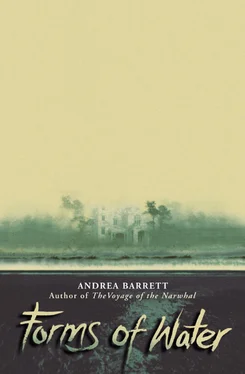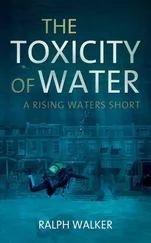“Of course he was bitter. We were all bitter. But bitter wasn’t what did your father in.”
“No? Bitter is hard on a man ….”
“It was the last day,” Marcus said. “When they announced that we’d taken the island. I was with a mopping-up operation further south — but your father was with the troops at Marpi Point.”
He paused, as if Henry would know what he meant. Henry had to admit that he’d never heard of the place.
“How could you not have heard of it? Don’t you read?”
“I was a little boy,” Henry said. “I was a baby.”
Marcus shook his head. “It was horrible. It was famous. The Japanese civilians who’d been hiding in caves during the invasion gathered on the cliffs at Marpi Point when they heard the island was lost — the Japanese soldiers had told them that the Americans were going to torture them if they surrendered. Our troops set up a PA system, and they got interpreters to tell the crowd that the fighting was over, that we had food and water waiting for them and that they were safe. It didn’t do any good. Your father told me they lined up on the cliff and jumped off, a hundred feet onto the rocks and the surf below. Men pushed their children in front of them. Women jumped with their babies on their backs. People stood and bowed to the American soldiers and then held grenades to their stomachs and pulled the pins. The water below the cliff was so full of bodies that the Navy boats couldn’t move without running over them. Your father stood there, screaming at these people not to jump, and they jumped and jumped and jumped. He saw …”
Marcus cleared his throat and stopped. When he continued, his voice was quiet.
“He said he saw a boy just your age jump into the water holding his father’s hand. He was never the same after that. He had malaria, and terrible dysentery, and he’d lost a lot of weight — they sent him to the New Hebrides with the first wave of troops to be rehabilitated. But he never got better. He couldn’t sleep. He couldn’t eat. When they finally shipped him home, he was in worse shape than when he’d left Saipan. And then he got here and saw the reservoir, and somehow the water here reminded him of the water there, below the cliffs … I don’t know. No one can really understand who wasn’t there. I was there, and I can’t understand.”
Henry heard everything Marcus said, but much of it passed over his head. He saw the scenes Marcus had described, but he saw them distantly, as if in a movie, drained of pain and blood and sound, and he could no more imagine what his father had felt than he could imagine himself in those places. He said to Marcus, “My father would never tell us what had happened there. My mother told us he was hurt in a place we couldn’t see.”
“True enough,” Marcus said, but then he closed the subject completely. “That’s enough,” he said. “That’s just enough of that. It makes me sick to talk about it.” He looked up from his hands and out the windshield. “Go slow here. These ruts are terrible. Do you recognize anything yet?”
Henry peered into the trees surrounding the van. The road looked like a hundred other roads he’d explored; the trees were just trees and he still didn’t know their names after all these years. Willows he recognized because they signaled water, and maples because Kitty had planted one in their backyard, but otherwise trees were either things to cut down to make way for buildings, or things to preserve to enhance the value of a lot. Fifty feet ahead of him, the road was blocked by a yellow gate.
“Pull over here,” Marcus said. “Anyplace is fine.”
Henry parked and looked around. He thought he sensed something in the woods to his right, a flash that was either memory or his old, skilled recognition of a likely plot. “We’re here?”
“Pretty much.”
Henry twisted around on his seat and looked at Brendan, who hadn’t said a word throughout Marcus’s story. “Isn’t this something?” Brendan’s eyes were shut and his face was very white. “Uncle Brendan? You okay?”
Brendan cleared his throat twice and said, “Fine. Just a little twinge.”
“What do you think? Do you remember this?”
“I never saw it. Or if I did, it was never like this — I was in the monastery before this road was built, long before your parents moved out here. I never saw the cabin.”
“It’s gone now,” Marcus said. “You want to get out?”
Together, Henry and Marcus lowered Brendan’s wheelchair to the ground. Bongo jumped out and darted past the gate, his nose half an inch above the ground as he followed some irresistible scent. A trail cut into the trees, twenty feet or so before the gate, and it wound up the gentle slope and then vanished. The slope, Henry saw, was the tail end of a long ridge running diagonal to the road.
Marcus pushed Brendan’s chair close to the trailhead and said, “Your land starts about a hundred yards in, I think — on the top of the ridge, running north and east. The section your brother lived on is at the far end of the parcel. You can still see where it was logged, even though it’s growing in. I wish there was a way to get you up there.”
“It doesn’t matter,” Brendan said. “I just wanted to know it was still here.”
“But it’s gorgeous. ” Henry turned to Brendan and Marcus, aware that his mouth was stretched in a childish grin. The parcel was remarkable, he could tell already — elevation, good drainage, obviously plenty of water. And if there was a view of the reservoir from the top of the ridge …
“I’d like to go down to the water,” Brendan said quietly. “Is there some way we can do that?”
“No problem,” Marcus said. “This road runs right to the water’s edge, and it’s not that bumpy — I can push you down.”
“Would you mind?” Henry said. “If I just did a little exploring? I’ll only be a few minutes, half an hour at most. I want to go up on the ridge.”
Marcus frowned. “You don’t want to come with us?”
“Let him go,” Brendan said. “It’s going to be his, and his sister’s — he might as well see it.”
Marcus shrugged, and then he took a pencil stub and a small notebook from his shirt pocket and sketched a rough map for Henry. “Look for the boulder, here, to the left of the trail, near the three birches — the boundary runs right near it. The far end, where your folks’ place was, is marked by the beginning of the logged area.”
“Great. I’ll just be a little while.” Henry stepped back to the van and changed his shoes for the sneakers he’d taken from Kitty’s, which made his feet feel light and youthful.
“We’ll be down at the water,” Marcus said. “It’s not very far. Come get us when you’re ready.” He stood quietly for a minute, his hands resting on the back of Brendan’s wheelchair. “You know, your parents …,” he said, but Henry was off before Marcus could finish his sentence.
He didn’t want to think about his parents anymore: not about his father struggling over steamy islands or watching people crash from cliffs, not about his mother chain-smoking by the radio or about the mornings when he and Wiloma had followed their parents through these woods, these very woods, on this trail or another, winding gently down and left toward the shore where the reservoir lapped at the rocks. The story Marcus had told him changed nothing — all these years he’d thought that if he knew what had happened to his father he’d understand what had happened to his own life. But the story was only a story; his parents were still dead.
The water was close, he remembered suddenly, just down the road and beyond that curve, and a small wooden dock jutted into the water. There was a shed someplace, where his father had rented a boat. He climbed with firm, strong steps until he reached the boulder Marcus had described, and then he stepped across that invisible line and thought, Mine, as his foot touched the springy moss. Mine, mine. He climbed higher, admiring the widely spaced old trees. A road cut through here might spare the best of them, preserving an authentic woodland feeling. Buyers were always willing to pay more for that.
Читать дальше












